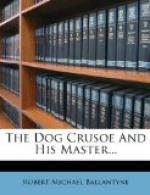“Isn’t it strange,” remarked Dick to Henri, as they passed among the tents towards the centre of the village—“isn’t it strange that them Injuns should be so fond o’ fightin’, when they’ve got all they can want—a fine country, lots o’ buffalo, an’, as far as I can see, happy homes?”
“Oui, it is remarkaibel, vraiment. Bot dey do more love war to peace. Dey loves to be excit-ed, I s’pose.”
“Humph! One would think the hunt we seed a little agone would be excitement enough. But, I say, that must he the chiefs tent, by the look o’t.”
Dick was right. The horsemen pulled up and dismounted opposite the principal chief’s tent, which was a larger and more elegant structure than the others. Meanwhile an immense concourse of women, children, and dogs gathered round the strangers, and while the latter yelped their dislike to white men, the former chattered continuously, as they discussed the appearance of the strangers and their errand, which latter soon became known. An end was put to this by San-it-sa-rish desiring the hunters to enter the tent, and spreading a buffalo robe for them to sit on. Two braves carried in their packs, and then led away their horses.
All this time Crusoe had kept as close as possible to his master’s side, feeling extremely uncomfortable in the midst of such a strange crowd, the more especially that the ill-looking Indian curs gave him expressive looks of hatred, and exhibited some desire to rush upon him in a body, so that he had to keep a sharp look-out all round him. When therefore Dick entered the tent, Crusoe endeavoured to do so along with him; but he was met by a blow on the nose from an old squaw, who scolded him in a shrill voice and bade him begone.
Either our hero’s knowledge of the Indian language was insufficient to enable him to understand the order, or he had resolved not to obey it, for instead of retreating, he drew a deep gurgling breath, curled his nose, and displayed a row of teeth that caused the old woman to draw back in alarm. Crusoe’s was a forgiving spirit. The instant that opposition ceased he forgot the injury, and was meekly advancing, when Dick held up his finger.
“Go outside, pup, and wait.”
Crusoe’s tail drooped; with a deep sigh he turned and left the tent. He took up a position near the entrance, however, and sat down resignedly. So meek, indeed, did the poor dog look that six mangy-looking curs felt their dastardly hearts emboldened to make a rush at him with boisterous yells.
Crusoe did not rise. He did not even condescend to turn his head toward them; but he looked at them out of the corner of his dark eye, wrinkled—very slightly—the skin of his nose, exhibited two beautiful fangs, and gave utterance to a soft remark, that might be described as quiet, deep-toned gurgling. It wasn’t much, but it was more than enough for the valiant six, who paused and snarled violently.
It was a peculiar trait of Crusoe’s gentle nature that, the moment any danger ceased, he resumed his expression of nonchalant gravity. The expression on this occasion was misunderstood, however; and as about two dozen additional yelping dogs had joined the ranks of the enemy, they advanced in close order to the attack.




